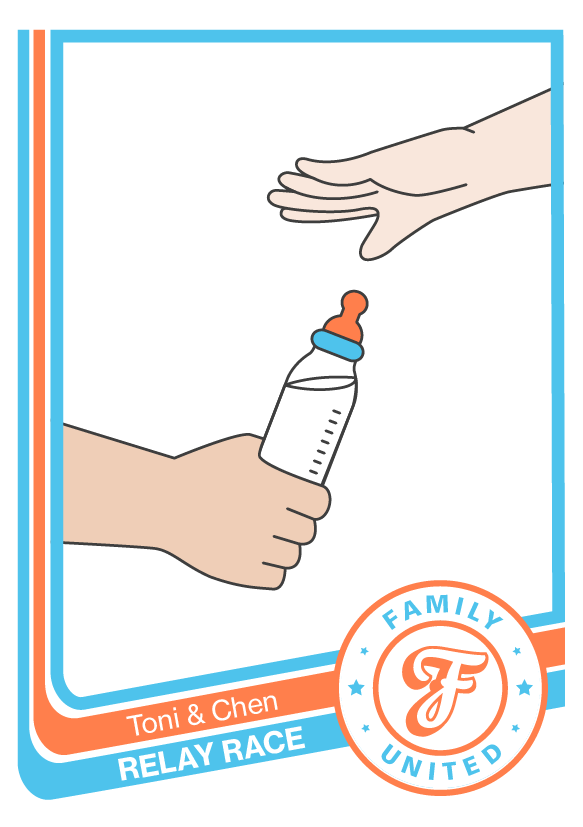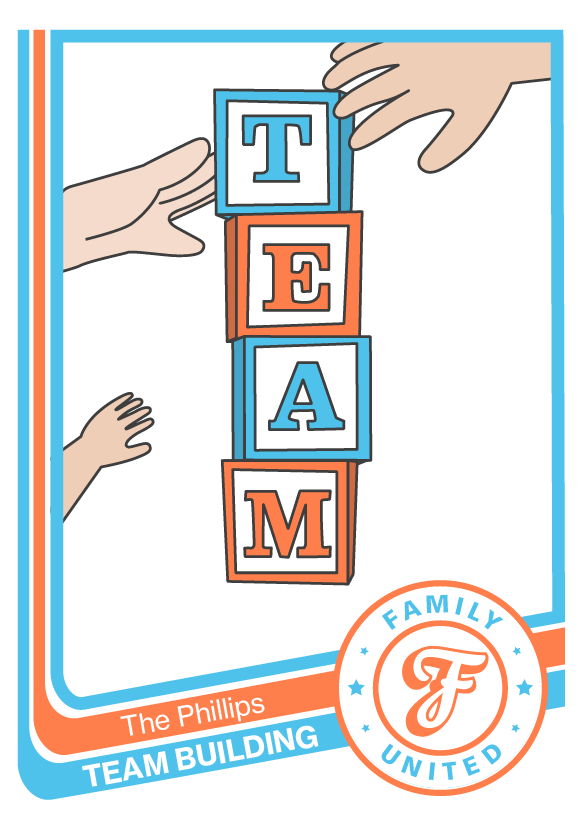Collaborate
It takes a team to raise a child, no matter what your team looks like. Collaboration is a great way to make families thrive and teach children how to build healthy relationships.

Logging in / Registering allows you access to participate in our online forums where you can help shape the activities undertaken by the Latrobe Health Assembly
Now that you are logged in, you can now manage your user profile, interact with our online discussion forums and much more.


Couples should try to work as a team. Ensuring that both parents get enough sleep and share housework and parenting tasks is important. Try and be kind to each other, give praise and encouragement and share your successes together.
Hover to flip
Tap to flip
“Kids need their parents in their corner, even in the most challenging of times.”Anonymous
“Sharing responsibility! Each person in my family shares the jobs and picks up the slack if the other person can’t. Don’t hold it against your partner or kid if they’re having a bad day. We’re all entitled to have an off day. Love each other.”Anonymous
“Let go of gender typical roles and work as a team. Acknowledge each other’s contribution and accept the other won’t do things the same way you do.”Megan
Couples should try to work as a team. Ensuring that both parents get enough sleep and share housework and parenting tasks is important. Try and be kind to each other, give praise and encouragement and share your successes together.

Raising children as a team means working together. It is important to come to an agreement on how to approach parenting, shared decision making and providing support to each other.
Make shared decisions on things like children’s bedtimes, family nutrition or discipline. If you’re part of a couple, you and your partner should discuss how you will share the job of managing your house, including things like managing paperwork and bills, chores and earning an income. Everyone deserves to have time to do the things they enjoy.
Hover to flip
Tap to flip
“Share the load. Be understanding. Get involved. If your wife breastfeeds and has been up all night, let her nap or make her a coffee”
Anonymous
“Trust and support. Being able to pass the responsibility to your partner so you can recharge”
Kristie
“We support each other when the other is struggling with parenting, step in and let them take a step back. Notice what’s happening for your partner and support each other – communicate together!”
Anonymous
Raising children as a team means working together. It is important to come to an agreement on how to approach parenting, shared decision making and providing support to each other.
Make shared decisions on things like children’s bedtimes, family nutrition or discipline. If you’re part of a couple, you and your partner should discuss how you will share the job of managing your house, including things like managing paperwork and bills, chores and earning an income. Everyone deserves to have time to do the things they enjoy.

Develop a support system of friends, family and/or health professionals, including parent groups and local resources, like crèches and playgroups. A great way to support your emotional health and wellbeing is by having a network of people around you. This could include family, friends, parent groups, playgroups or health professionals.
Hover to flip
Tap to flip
“Find a group of other parents with kids in the same stages of growth as yours and be honest with each other about what you struggle with and what has been great. Not everyone will reciprocate, but it will help them to understand that they’re not alone.”Anonymous
“It takes a community, make sure you surround yourself with people who support you and community services as well”Natasha
“Join play groups, kindergarten and primary school committees. Become a committee member of local sport clubs”Anonymous
Develop a support system of friends, family and/or health professionals, including parent groups and local resources, like crèches and playgroups. A great way to support your emotional health and wellbeing is by having a network of people around you. This could include family, friends, parent groups, playgroups or health professionals.
![]()
The skills and fitness a person develops and applies through movement. This includes coordination, balance, flexibility, agility, strength, endurance and reaction time.
How do you build your movement skills?
Click on the links below for some great examples of initiatives that help build Movement skills.
![]()
The attitudes and emotions a person has towards movement and the impact they have on their confidence and motivation to move. This includes confidence, motivation, self-perception, and self-regulation of emotions.
How do you find the motivation and confidence to move?
Click on the links below for some great examples of initiatives that encourage finding enjoyment in Movement.
![]()
A person’s interaction with others in relation to movement. This includes relationships, collaboration, ethics, and culture in society.
How do you interact with others during movement?
Click on the links below for some great examples of initiatives that encourage social interaction during Movement.
![]()
A person’s understanding of how, why and when they move. This includes safety and risk, rules, reasoning, strategy and planning, perceptual awareness and tactics.
How do you gain knowledge around movement?
Click on the links below for some great examples of initiatives that increase knowledge around Movement.
 Do you have a chronic condition, or do you care for someone who does?
Do you have a chronic condition, or do you care for someone who does?
Together with Ninety Mile Consulting, we’re exploring the community’s experiences and ideas for the early detection and management of chronic conditions — health conditions needing ongoing management and/or treatment.